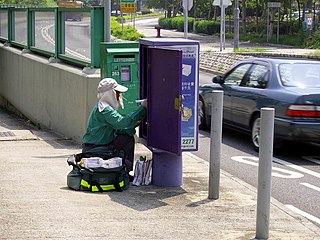Related Research Articles

The United States Postal Service (USPS), also known as the Post Office, U.S. Mail, or simply the Postal Service, is an independent agency of the executive branch of the United States federal government responsible for providing postal service in the United States, its insular areas and associated states. It is one of a few government agencies explicitly authorized by the Constitution of the United States. As of 2023, the USPS has 525,469 career employees and 114,623 non-career employees.

The mail or post is a system for physically transporting postcards, letters, and parcels. A postal service can be private or public, though many governments place restrictions on private systems. Since the mid-19th century, national postal systems have generally been established as a government monopoly, with a fee on the article prepaid. Proof of payment is usually in the form of an adhesive postage stamp, but a postage meter is also used for bulk mailing.

A ZIP Code is a system of postal codes used by the United States Postal Service (USPS). The term ZIP was chosen to suggest that the mail travels more efficiently and quickly when senders use the code in the postal address. The Philippine Postal Corporation also uses this terminology for the postal code system in the Philippines.

Postal codes used in the United Kingdom, British Overseas Territories and Crown dependencies are known as postcodes. They are alphanumeric and were adopted nationally between 11 October 1959 and 1974, having been devised by the General Post Office.

Royal Mail Group Limited, trading as Royal Mail, is a British postal service and courier company. It is owned by International Distribution Services. It operates the brands Royal Mail and Parcelforce Worldwide (parcels). Formed in 2001, the company used the name Consignia for a brief period but changed it soon afterwards. Prior to this date, Royal Mail and Parcelforce were part of the Post Office, a UK state-owned enterprise the history of which is summarised below. Long before it came to be a company name, the 'Royal Mail' brand had been used by the General Post Office to identify its distribution network.
Poste restante, also known as general delivery in North American English, is a service where the post office holds the mail until the recipient calls for it. It is a common destination for mail for people who are visiting a particular location and have no need, or no way, of having mail delivered directly to their place of residence at that time.

A post office box is a uniquely addressable lockable box located on the premises of a post office.

A letter box, letterbox, letter plate, letter hole, mail slot or mailbox is a receptacle for receiving incoming mail at a private residence or business. For outgoing mail, post boxes are often used for depositing the mail for collection, although some letter boxes are also capable of holding outgoing mail for a carrier to pick up. Letterboxes or mailboxes use the following primary designs:
Mail fraud and wire fraud are terms used in the United States to describe the use of a physical or electronic mail system to defraud another, and are U.S. federal crimes. Jurisdiction is claimed by the federal government if the illegal activity crosses interstate or international borders.
A suite is the location of a business within a shopping mall or office building. The suite's number also serves as a sort of address within an address for purposes of mail delivery and pickup.
Email fraud is intentional deception for either personal gain or to damage another individual using email as the vehicle. Almost as soon as email became widely used, it began to be used as a means to defraud people, just as telephony and paper mail were used by previous generations.

A permanent account number (PAN) is a ten-character alphanumeric identifier, issued in the form of a polycarbonate card, by the Indian Income Tax Department, to any person who applies for it or to whom the department allots the number without an application. It can also be obtained in the form of a PDF file known as an e-PAN from the website of the Indian Income Tax Department.

The United States Postal Inspection Service (USPIS), or the Postal Inspectors, is the federal law enforcement arm of the United States Postal Service. It supports and protects the U.S. Postal Service, its employees, infrastructure, and customers by enforcing the laws that defend the United States' mail system from illegal or dangerous use. Its jurisdiction covers any crimes that may adversely affect or fraudulently use the U.S. Mail, the postal system, or postal employees. With roots going back to the late 18th century, the USPIS is the country's oldest continuously operating federal law enforcement agency.
Identity fraud is the use by one person of another person's personal information, without authorization, to commit a crime or to deceive or defraud that other person or a third person. Most identity fraud is committed in the context of financial advantages, such as accessing a victim's credit card, bank accounts, or loan accounts. False or forged identity documents have been used in criminal activity or in dealings with government agencies, such as immigration. Today, the identities of real persons are often used in the preparation of these false documents. This can lead to bad consequences and trouble.
Internet fraud prevention is the act of stopping various types of internet fraud. Due to the many different ways of committing fraud over the Internet, such as stolen credit cards, identity theft, phishing, and chargebacks, users of the Internet, including online merchants, financial institutions and consumers who make online purchases, must make sure to avoid or minimize the risk of falling prey to such scams.

Credit card fraud is an inclusive term for fraud committed using a payment card, such as a credit card or debit card. The purpose may be to obtain goods or services or to make payment to another account, which is controlled by a criminal. The Payment Card Industry Data Security Standard is the data security standard created to help financial institutions process card payments securely and reduce card fraud.

A credit card is a payment card, usually issued by a bank, allowing its users to purchase goods or services, or withdraw cash, on credit. Using the card thus accrues debt that has to be repaid later. Credit cards are one of the most widely used forms of payment across the world.
A card-not-present transaction is a payment card transaction made where the cardholder does not or cannot physically present the card for a merchant's visual examination at the time that an order is given and payment effected. It is most commonly used for payments made over the Internet, but can also be used with mail-order transactions by mail or fax, or over the telephone.
Postal address verification is the process used to check the validity and deliverability of a physical mailing address. According to the United States Postal Service, an address is valid if it is CASS-certified, meaning that it exists within the comprehensive list of mailable addresses in their Address Management System. This is different from the credit card Address Verification System (AVS), which is the method used by credit card processors to authenticate ownership of a credit card by verifying that the account on the credit card matches the billing address on file. Credit card AVS does not determine deliverability of an address.

A package redirection scam is a form of e-commerce fraud, where a malicious actor manipulates a shipping label, to trick the mail carrier into delivering the package to the wrong address. This is usually done through product returns to make the merchant believe that they mishandled the return package, and thus provide a refund without the item being returned. It can also be done by the seller, generally by creating fraudulent online stores or creating fake listings on sites such as eBay or Mercari. This makes it very hard to perform a chargeback, as the tracking shows the item has been delivered. This is also known as an FTID scam, standing for Fake Tracking ID. When this scam is successful, the tracking number will show that the package has been delivered to the correct address, when the package was instead delivered to a different address. This package is generally empty or filled with garbage. However, this scam has mostly been “patched” via new technology provided by the various couriers globally. It is estimated the scam cost retailers £18,000,000,000 in lost revenue.